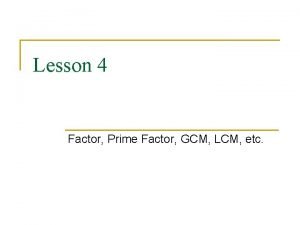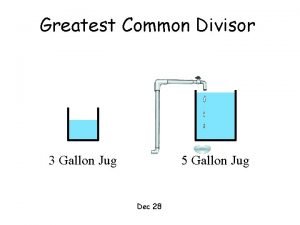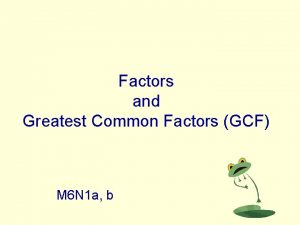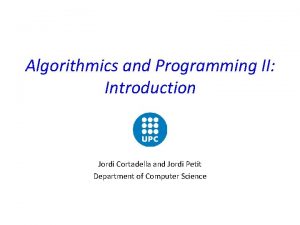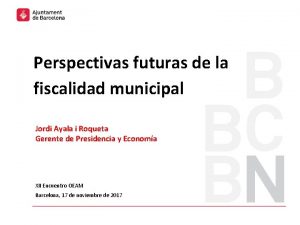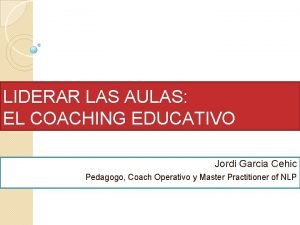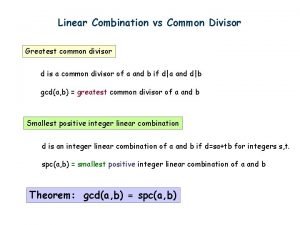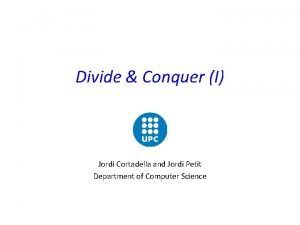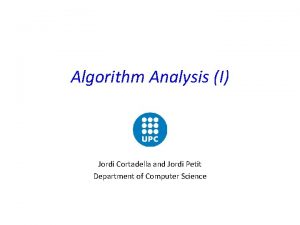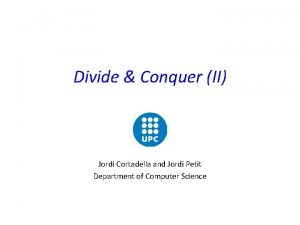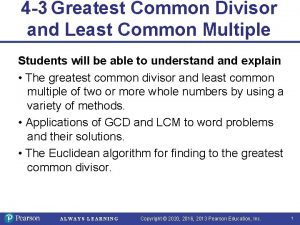Greatest Common Divisor Jordi Cortadella Department of Computer






















- Slides: 22

Greatest Common Divisor Jordi Cortadella Department of Computer Science

Simplifying fractions • greatest common divisor Introduction to Programming © Dept. CS, UPC 2

The largest square tile 4 4 h=24 w = 60 What is the largest square tile that can exactly cover a w h rectangle? 90 tiles of side-length 4 Introduction to Programming © Dept. CS, UPC 3

The largest square tile 6 6 h=24 w = 60 What is the largest square tile that can exactly cover a w h rectangle? 90 tiles of side-length 4 40 tiles of side-length 6 Introduction to Programming © Dept. CS, UPC 4

The largest square tile 12 12 h=24 w = 60 What is the largest square tile that can exactly cover a w h rectangle? 90 tiles of side-length 4 40 tiles of side-length 6 10 tiles of side-length 12 Introduction to Programming © Dept. CS, UPC 5

The largest square tile 12 12 h=24 w = 60 What is the largest square tile that can exactly cover a w h rectangle? 60 24 = (5 12) (2 12) = (5 2) (12 12) gcd(60, 24) Introduction to Programming © Dept. CS, UPC number of tiles largest tile 6

Euclid (300 B. C. ) A fragment of Euclid’s Elements http: //www. math. ubc. ca/~cass/Euclid/papyrus/tha. jpg Introduction to Programming © Dept. CS, UPC 7

Euclidean algorithm for gcd • Introduction to Programming © Dept. CS, UPC 8

Euclidean algorithm for gcd 147 21 1071 462 Introduction to Programming © Dept. CS, UPC 9

Euclidean algorithm for gcd • Properties: gcd(a, a) = a; gcd(a, 0) = a If a b, then gcd(a, b) = gcd(a b, b) • Example: Introduction to Programming a 114 72 30 b 42 42 42 30 18 6 6 12 12 12 6 © Dept. CS, UPC gcd (114, 42) 10

Euclidean algorithm for gcd // Pre: a > 0, b > 0 // Returns the greatest common divisor of a and b int gcd(int a, int while (a != b) if (a > b) else b = b } return a; } Introduction to Programming b) { { a = a – b; – a; © Dept. CS, UPC 11

Euclidean algorithm for gcd Introduction to Programming iteration a b 0 10, 001 154 1 9, 999, 847 154 2 9, 999, 693 154 3 9, 999, 539 154 … … 154 64, 934 165 154 64, 935 11 154 64, 936 11 143 64, 937 11 132 64, 938 11 121 64, 939 11 110 … 11 … 64, 947 11 22 64, 948 11 11 © Dept. CS, UPC 10000001 154 11 64935 12

Faster Euclidean algorithm for gcd • Properties: gcd(a, 0) = a If b 0 then gcd(a, b) = gcd(a%b, b) • Example a 10, 001 11 11 Introduction to Programming © Dept. CS, UPC b 154 0 13

Faster Euclidean algorithm for gcd // Pre: a 0, b 0 // Returns the greatest common divisor of a and b int gcd(int a, int b) { while (a != 0 and b != 0) { if (a > b) a = a%b; else b = b%a; } return a + b; not } Termination: a == 0 or b == 0 Introduction to Programming © Dept. CS, UPC 14

Faster Euclidean algorithm for gcd // Pre: a 0, b 0 // Returns the greatest common divisor of a and b int gcd(int a, int b) { while (b > 0) { int r = a%b; a = b; b = r; a b } x y return a; } y > x%y Introduction to Programming © Dept. CS, UPC a 42 114 42 b 114 42 30 30 12 6 0 15

Comparing algorithms for gcd int gcd(int a, int b) { while (a > 0 and b > 0) { if (a > b) a = a%b; else b = b%a; } return a + b; } Every iteration: • 3 comparisons • 1 mod operation Introduction to Programming int gcd(int a, int b) { while (b > 0) { int r = a%b; a = b; b = r; } return a; } Every iteration: • 1 comparison • 1 mod operation © Dept. CS, UPC 16

Efficiency of the Euclidean algorithm How many iterations will Euclid’s algorithm need to calculate gcd(a, b) in the worst case (assume a > b)? – Subtraction version: a iterations (consider gcd(1000000, 1)) – Modulo version: 5 d(b) iterations, where d(b) is the number of digits of b (Gabriel Lamé, 1844) Introduction to Programming © Dept. CS, UPC 17

Binary Euclidean algorithm Computers can perform 2 and /2 operations efficiently (217)10 = (11011001)2 (217 2)10 = (434)10 = (110110010)2 (217/2)10 = (108)10 = (1101100)2 (217%2)10 = 1 (least significant bit) Introduction to Programming © Dept. CS, UPC 18

Binary Euclidean algorithm Assume a b: a a b 0 gcd(a, b) a even 2 gcd(a/2, b/2) even odd odd gcd(a/2, b) gcd(a, b/2) gcd((a-b)/2, b) a 132 66 33 b 84 42 21 6 3 3 21 21 9 3 0 2 2 3 12 Introduction to Programming © Dept. CS, UPC 19

Binary Euclidean algorithm // Pre: a 0, b 0 // Returns the greatest common divisor of a and b int gcd(int a, int b) { int r = 1; // Accumulates common powers of two while (a != 0 and b != 0) { if (a%2 == 0 and b%2 == 0) { a = a/2; b = b/2; r = r 2; } else if (a%2 == 0) a = a/2; else if (b%2 == 0) b = b/2; else if (a > b) a = (a - b)/2; else b = (b – a)/2; } return (a + b) r; } Introduction to Programming © Dept. CS, UPC 20

Binary Euclidean algorithm // Pre: a 0, b 0 // Returns the greatest common divisor of a and b int gcd(int a, int b) { if (a == 0 or b == 0) return a + b; int r while a b r } = 1; // Accumulates common powers of two (a%2 == 0 and b%2 == 0) { = a/2; = b/2; = r 2; while (a != b) { if (a%2 == 0) a = a/2; else if (b%2 == 0) b = b/2; else if (a > b) a = (a - b)/2; else b = (b – a)/2; } return a r; } Introduction to Programming © Dept. CS, UPC 21

Summary • Euclid’s algorithm is very simple. • It is widely used in some applications related to cryptography (e. g. , electronic commerce). • Euclid’s algorithm efficiently computes the gcd of very large numbers. • Question: how would you compute the least common multiple of two numbers efficiently? Introduction to Programming © Dept. CS, UPC 22
 Jordi cortadella
Jordi cortadella Greatest common diviser
Greatest common diviser 4-3 gallon water jug problem
4-3 gallon water jug problem Find the gcf of 28 and 42
Find the gcf of 28 and 42 Greatest common factor and least common factor
Greatest common factor and least common factor Lcm of 16 24 and 40
Lcm of 16 24 and 40 Jordi reviriego
Jordi reviriego Jordi ustrell
Jordi ustrell Jordi benlliure
Jordi benlliure Jordi petit upc
Jordi petit upc Jordi juanico sabate
Jordi juanico sabate Jordi timmers
Jordi timmers Jordi ayala roqueta
Jordi ayala roqueta Jordi vives i batlle
Jordi vives i batlle Jordi garcia cehic
Jordi garcia cehic Jordi graells costa
Jordi graells costa Jordi npa
Jordi npa Jordi scene
Jordi scene Cmedium
Cmedium Jordi olivares
Jordi olivares Jordi gisbert
Jordi gisbert Dev23
Dev23 How do you find the greatest common factor of two numbers
How do you find the greatest common factor of two numbers

